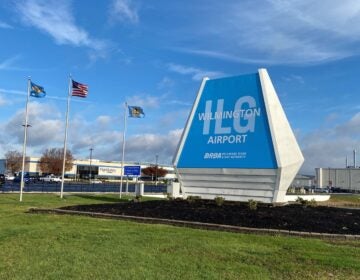45 years later, Delaware family accepts personal belongings of U.S. soldier lost in Vietnam [video]
If the idea behind Memorial Day is to remember the ultimate sacrifice made by our soldiers, the story of Delaware soldier Michael Momcilovich’s death, and the work that went into preserving his memory, can only be described as extraordinary.
The story is 45 years in the making. Captain Michael Momcilovich of New Castle County died in a helicopter crash near the Vietnam demilitarized zone on May 5, 1968. It took another 10 years before some of his personal artifacts were found at the crash site. It was 1990 before they were brought to the United States, and it was only last February before a link was made to the family to bring them home.
A military family’s story
Momcilovich’s brother Mark remembers him as a popular student at Brandywine High School, a guy who liked cars. Their father served in World War II. So in 1961, when he received an appointment to West Point, military service seemed a normal part of growing up.
Momcilovich was first assigned to Europe. He went to Vietnam in September 1967 as a medevac helicopter pilot. In January, he had been trained to operate on a Huey-Cobra helicopter gunship. He was operating one such mission in May ’68.
About that time the News Journal started running letters from soldiers about life on the battle front. Nancy Lynch coordinated that effort. One of the first letters she received for her column was from Momcilovich. Brother Mark says the column asked for gripes about the military. “He sounded like me,” Mark said. “He was respectful.”
“He wrote ‘Dear Miss Lynch,'” Lynch recalled. “Everyone always called me Nancy. I didn’t realize it at the time, but that was the last letter he wrote before he died.”
His chopper was shot down by enemy gunfire, and Momcilovich was buried a month later. To the family and to Lynch, that was the end of the story. But as is the case sometimes with war, the story doesn’t always have a complete ending.
A trans-Pacific friendship
Ngoc Van Vo, a soldier in the South Vietnamese Army, had a love of the United States and appreciation of the American soldiers. He grew up poor. He knew the language of his native Vietnam and French. Along the way, as more U.S. soldiers arrived in his country, he taught himself English. That caught the attention of the U.S. military, and they allowed him to go to Alabama for more training in 1970. By the time he returned, he had become an integral part of the logistics of the war.
Ngoc would shine large spotlights so American soldiers could complete their missions. He and American soldier Bill Melfi worked closely together, and by the time Melfi left Vietnam in 1972, their bond was complete. He wrote Ngoc and kept up with his life until 1975, when South Vietnam surrendered to North Vietnam, the Americans left that year, and communications were cut off.
“We had nothing to eat, very poor,” Ngoc reflected as he talked about life afterward.
His family survived by stripping materials from aircraft wreckage at wartime crash sites and selling the metal. Ngoc’s 14-year-old son would go into the sites along the DMZ. In 1978 he came upon Momcilovich’s crash site. Not only did he get the metal, but he also found some scraps of paper.
It was the Delaware driver’s license.
Detective work
Ngoc’s son knew how much it would mean to his father to give him an American military artifact. He put it in an envelope and wrote “Pilot Captain or Lieutenant Mike Momcilovich Jr.” on the front. Ngoc knew there was only one person who could help him identify the soldier: his friend Bill Melfi.
He found a way to get back in touch with Melfi in 1984. By 1990 Ngoc’s family were able to leave Vietnam, and he joined his friend in Florida. Six weeks after his arrival, he showed Melfi the charred remains of the license. Melfi tried to locate the family, but got nowhere.
“The Internet was not as sophisticated as it is now,” Melfi said. “I don’t even think his name was on the Vietnam Wall at the time.”
He kept the artifacts at first in a drawer and then on top of the refrigerator. “In February [2013] I opened the fridge, and they fell down in my hands,” Melfi said. “I saw that as a sign.”
He went online, and this time the Momcilovich name was linked with Nancy Lynch.
Only in Delaware
When Lynch first heard Melfi’s story, she was amazed. She is currently working on a book, containing some 900 letters from the Vietnam War, called “Vietnam Mailbag, Voices From the War: 1968-1972.”
She traveled to Florida in March to see the artifacts. When she researched the name, she realized something more amazing: She had previously met Mark Momcilovich’s daughter Lana at a parade in Newark.
Over the last few months, she has worked to bring together the families involved in this story. The timing worked out so that Momcilovich’s daughter, Krtistin James, was able to formally accept his personal artifacts from Ngoc at Wilmington’s 146th Memorial Day Parade on Thursday.
James was only 15 months old when her father died in that helicopter crash. She credits her family and “Uncle Mark” for keeping the memories of her father alive. As she gathered Thursday morning at the Vietnam War Memorial in Brandywine Park, she thanked Ngoc for what he had done.
“I can’t begin to imagine what you went through to preserve this license,” she said. “There are no words to describe how grateful I am to you and your wife.”
She thanked Lynch for her work on her book. “If it wasn’t for the book, none of this would be happening,” she said.
Lynch summed it up by saying this could only happen in a small state like Delaware. “Things like this happen, and it makes us all feel good,” she added.
WHYY is your source for fact-based, in-depth journalism and information. As a nonprofit organization, we rely on financial support from readers like you. Please give today.




